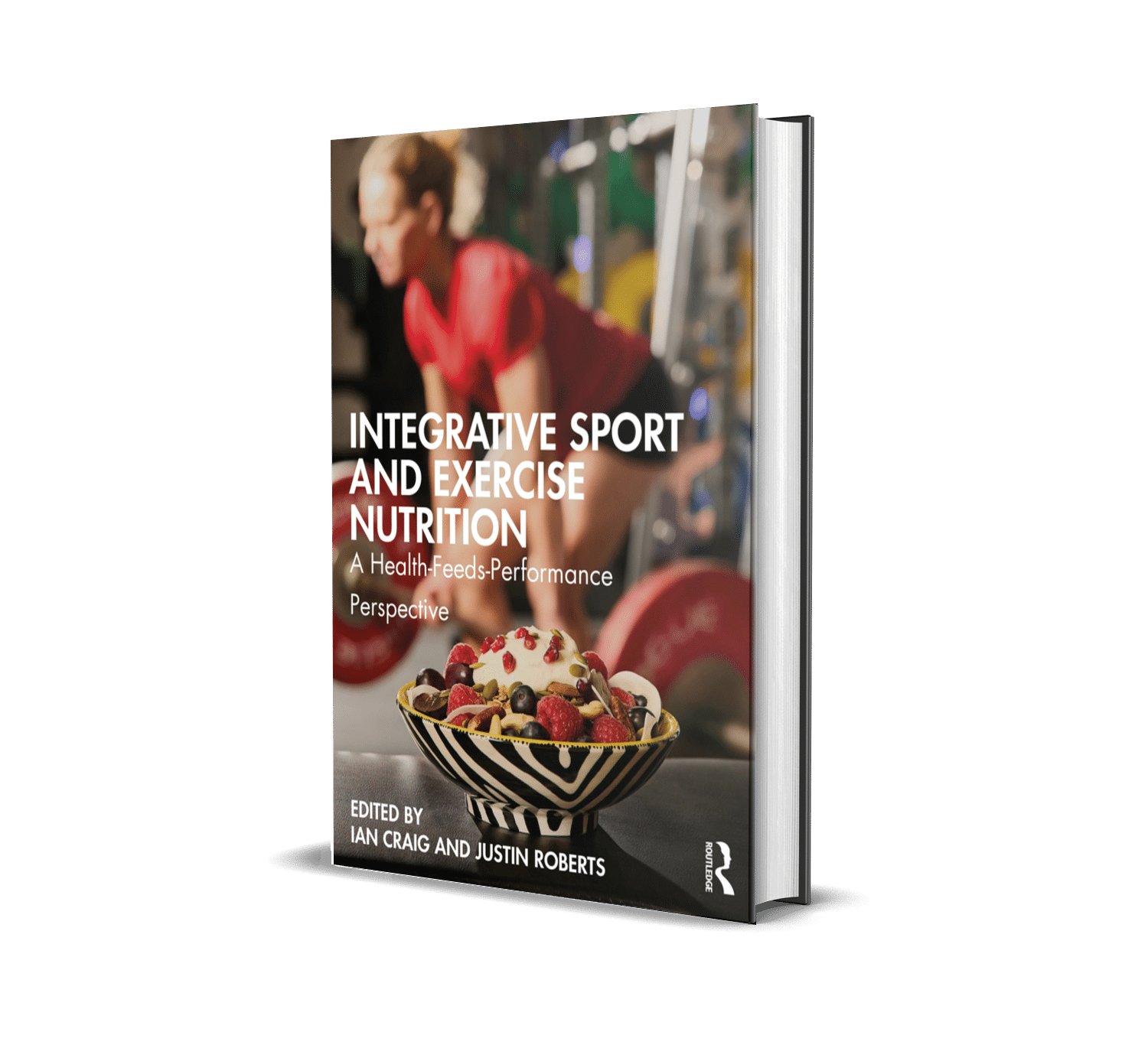Chapter 1 – Integrative Sports Nutrition: An Introduction
By Justin Roberts, Ian Craig, Lars McNaughton and Pete Williams
Welcome to the online resource centre for the textbook of Integrative Sport and Exercise Nutrition. Here you’ll be able to view the synopsis and preface of the book, read about the editors and contributors, review the table of contents, and purchase the book. Additionally, by clicking through to individual chapters, you can access: extended articles and case studies associated with the topics and/or authors of the chapter, downloadable powerpoint figures from the chapter, podcast interviews with, and webinar presentations from the authors.
Please note that this resource site is an ongoing project, so to stay up-to-date with new additions, please subscribe to the Integrative Sport and Exercise Nutrition newsletter

Use code ISEN25 at publisher’s checkout to receive a 25% discount till 1st of December 2025
Integrative Sport and Exercise Nutrition: A Health‐Feeds‐Performance Perspective defines health as an underpinning requirement for active pursuit and sporting performance. By focusing on the empowerment of scientists and practitioners who support such individuals, this new textbook powerfully disseminates academic and experiential knowledge in a thoroughly applied context. The prevailing paradigm that has existed within the academic enquiry of sports nutrition has typically viewed macronutrients as ‘fuel’ for exercise endeavours. While this notion provides a basis of quantitative nutritional support, what happens when our active individual lacks adequate digestive health to assimilate these foods, and in the process creates an inflammatory tone in their body? And what happens when our aspiring athlete is genetically not suited to the diet that is prescribed by the sports nutritionist, which is based merely on the energetic needs of their sport?
The underlying aim of Integrative Sport and Exercise Nutrition is to encourage sport, exercise and nutrition professionals, academics and students to embrace the physiological complexity and individuality of an exercising person. This approach highlights the need to go beyond traditional macronutrient approaches dominant in this field, and consider how our food impacts physiological health from an integrative body systems perspective. Within the context of heavy training loads, often alongside significant life stressors, such practitioners can support the robust health and performance requirements of active individuals. This cutting‐edge book thereby brings together the scientific voice of academics with the ‘real‐world’ experience of nutrition and exercise practitioners, and by doing so, the editors wish to stimulate a new paradigm of thought towards integrative and personalised thinking in sport and exercise.
By Justin Roberts, Ian Craig, Lars McNaughton and Pete Williams
By Michelle Barrow, Karen Harrison and Ian Craig
By Ian Craig, Justin Roberts, Jamie Pugh and Rick Miller
By Heidi N. Du Preez, Katherine Caris-Harris and Ian Craig
By Glen Davison, Amy Desborough and Justin Roberts
By Ian Craig, Zac van Heerden and Hannah Moir
By Ian Craig, Desmond Gilmore and Warren Brown
By David Clayton, Andrew Holwerda and Ruth Wilde
By Justin Roberts, Ricardo Adamo, Kylene Bogden and Ian Craig
By Simone do Carmo, Joseph Lillis, Jose Villa-Rodriguez and Justin Roberts
By Henry Chung, Shaun Chapman, Alessandro Ferretti and Justin Roberts
By Ian Craig, Justin Roberts, Matt Lovell and Jennie Carter
By Guillermo Escalante, Simone do Carmo and Paul Ehren
By Shawn Arent and Henrietta Paxton
By Andy Blow, Emily Arrell and Judith Haudum
Matt Cole, Henrietta Paxton and Rachel Jesson
 Incredible energy can be experienced through the freedom of movement, just as wisdom awaits anybody who explores freedom of thought. What we then do with these expressions of mind and body is what makes us human…
Incredible energy can be experienced through the freedom of movement, just as wisdom awaits anybody who explores freedom of thought. What we then do with these expressions of mind and body is what makes us human…
I chose to help people become a more active and healthier version of themselves, although this didn’t happen by conscious intent. I’ve always been fascinated by the study of the human body as it moves dynamically and during my initial studies in exercise physiology, I very much enjoyed constructing and conducting research studies. But by the time I’d completed my MSc, instead of extending my academic curiosity further, I chose to chase my childhood dream of becoming an Olympic middle‐distance runner. To fund my goal, I became what was (in the 1990s) a very over‐qualified personal trainer; I had thought that I’d get myself ‘a proper job’ later on!
But by the time I’d realised that the Olympics were out of reach (although I’d learned and experienced a lot trying), I’d become quite entranced with the uniqueness and individual complexities of my clients. I realised their goals were generally not attainable with formulaic exercise protocols and I’d also become disillusioned with the reductionist and quantitative carb‐fat‐protein nutrition notions I’d been taught at university. When I got good results, it was when I, the practitioner, had become part of my client’s ecosystem (see Chapter 1), helping them to gently unravel the parts of their life that no longer served them and encouraging the parts of their existence that gave them energy, purpose, and ‘life’.
That was 25 years ago. After studying further, this time in nutritional therapy, I then began combining my new interests of the nutritional support of integrative body systems (gastrointestinal, musculoskeletal, detoxification, neuroendocrine, immune, cardiovascular, etc.), and my existing knowledge of physiology, into sport and exercise. As such, I was actually asked to put together a Personalised Sports Nutrition MSc module in 2007 and spent about a month trying to find a suitable textbook for it. Well, there was none… I could find incredible texts within integrative health studies and disease management (medicine) and neatly applied nutrient‐centred sports nutrition books, but just no active ‘people‐focussed’ ones.
Since that time I’ve tried my very best to connect the dots between integrative thinking and the applied translation of research into sport and exercise; via personal research, teaching, writing and clinically practicing my skills within the lives of the many active individuals who have entrusted my help all these years.
I’m incredibly proud of and grateful for, the invaluable collaboration of my wise colleague and friend, Justin, who has pushed my professional boundaries, and all the amazing contributors within these pages, to now present you with ‘that’ textbook. As you absorb the meaning of the quote below, from The Logic of Life: The Challenge of Integrative Physiology (Noble and Boyd, 1993), explore the pages that we’ve prepared for you with curiosity and freedom of thought.
“What characterises what they (scientist/practitioner/coach) are doing, we suggest, is not the apparatus they use, but rather the way in which they think”.
Ian Craig
 So why this book? With numerous sport and exercise nutrition texts and articles out there why add one more? A good question.
So why this book? With numerous sport and exercise nutrition texts and articles out there why add one more? A good question.
I can’t actually remember when it was that Ian first approached me with the idea for this book. It was ‘several years’ ago. But, I do remember at the time being immersed in research studies and therefore declined. However, for those who know Ian, you will know he has a calm, logical and pleasantly persistent manner about him. He kept asking and I kept thinking.
His vision for an integrative approach to sport and exercise nutrition made real sense. What inspired me to venture into the world of nutrition goes way back to the early 1990s. I had just finished my degree and took up a position as a personal trainer. One day, these two huge bodybuilders came to the gym talking about an ‘individualised nutrition’ programme tailored to the needs/goals of the client. I was fascinated. But I needed to know more about the science (which back then wasn’t as developed as it is now) as much as the application. Importantly, even back then, ‘individualised’ and ‘integrative’ thinking were ‘in play’ and clients/athletes were reaping the benefits (the practice was ahead of the science).
Having worked in both academia and applied practice for over three decades, it’s been interesting to observe changes in nutrition discoveries, philosophies and approaches through the combined lens of a researcher and ‘what athletes actually do in the real‐world’. No two athletes are the same and, while there is a wealth of good information out there, the challenge comes with how best to apply it with the individual in mind.
My passion for nutritional physiology has grown over the years working alongside several phenomenal mentors, one of which, Emeritus Professor Craig Sharp, will always stand out for me. Widely regarded as the founding father of sports science in the UK, he had a truly wonderful demeanour and a real curiosity for scientific understanding, translational applications and the limits of human performance. He once sent me the following [abridged] quote:
“Thus, the task is [not] to see what no one has yet seen; but to think what nobody has yet thought, [but] which everybody sees”.
Just take a moment to contemplate these words. Now, whether this quote was attributed to Schrödinger or Schopenhauer (depending on what you read), Professor Sharp’s sage approach continues to echo with me today and perhaps even captures the essence of this book. Everyone knows that human physiology is complex (‘that which everybody sees’), and so too is nutrition. Answers to complex questions are often never simple. While evidence‐based science is critically important, going beyond reductionist thinking (‘the pure scientist’) to consider the ‘pieces of the puzzle’ (‘the applied practitioner’) allows a wider appreciation of the integrative synergies between nutrition, physiology, biochemistry and cellular functioning. Perhaps then, we need to look at nutrition through an integrative lens (‘what nobody has yet thought’) by blending awareness of ‘the athlete’s story’, having a deep appreciation of high‐quality, nourishing foods and a fundamental grasp of the mechanistic interconnectedness of physiological systems. And so I decided to take on this challenge… for that, Ian, I am grateful for your persistence, your dedication, for pushing my own limits but, mostly importantly, your friendship.
At the simplest level, this book aims to provide awareness of integrative nutrition. Integrative in the sense of the complexity of human physiology and the interconnectedness of our body systems. Integrative in the sense that nutritional intake is not just about what we eat, but also what our food is actually doing for us; and integrative in the sense that sharing knowledge between (and even within) disciplines may help develop further appreciation towards best practice, with the athlete’s health and performance at the heart of the story.
When reading this book, as the saying goes, take what is useful. We encourage you to read widely (and critically), learn how to consider a balanced argument from the evidence and, most importantly, learn how to translate nutrition into practice, with the athlete’s health being a fundamental primer for actual performance. When designing this book, our intention was to bring together the academic and practitioner voice in each chapter (each voice has a lot to offer and we can learn from both); to find the ‘magic in the middle’, to spark forward‐thinking and the journey towards integrative sport and exercise nutrition.
Professor Justin Roberts
Ian Craig, MSc, DipCNE, FBANT is the founder of the Centre for Integrative Sports Nutrition (CISN) and course leader of their online postgraduate level courses.
With joint academic backgrounds in exercise physiology and nutritional therapy, and a long career as a middle‐distance athlete and coach behind him, Ian has been developing the concept of integrative sports nutrition for the past two decades: a fast‐evolving discipline that considers both the health and performance of an athlete from an integrative health perspective.
He is the co‐author of Wholesome Nutrition, which he wrote with his natural chef wife, Rachel Jesson, and was the editor of UK magazine Functional Sports Nutrition (Target Publishing) for 12 years. Additionally, Ian developed and facilitated the first Personalised Sports Nutrition postgraduate module at the Centre for Nutrition Education and Lifestyle Management (Middlesex University), the Functional Sports Nutrition Academy and the IHCAN Functional Sports Nutrition conference (hosted by Target Publishing).
As co‐founder of the Nutritional Institute, Ian is a clinical practitioner, based in his native Scotland. His client cases range from nutritionally supporting recreational and elite athletes to exercise and lifestyle‐induced health imbalances, including overtraining, chronic fatigue, autoimmunity and others.
He gained his BSc in Physiology and Sports Science from the University of Glasgow, his MSc in Exercise Physiology from the University of North Carolina at Greensboro and his BSc and practice diploma in Nutritional Therapy at the Centre for Nutrition Education and Lifestyle Management, validated by Middlesex University in London. He published both his exercise physiology research theses and contributed to a series of research studies conducted by his mentor Dr Don Morgan in North Carolina.
Ian is a professional member and Fellow of the British Association for Nutrition and Lifestyle Medicine (BANT).
Website: www.intsportsnutrition.com
LinkedIn: www.linkedin.com/in/ian‐craig‐nutrition
Justin Roberts, PhD, SFHEA, FBANT is a Professor of Nutritional Physiology applied to exercise and functional health within the Cambridge Centre for Sport and Exercise Sciences, Anglia Ruskin University, Cambridge, UK. He is a Fellow Member and BANT Registered Nutritionist, Editor‐in‐Chief of the Nutrition Evidence Database (supporting an evidence‐based approach for nutrition professionals), and Chair of the Nutritional Therapy Education Commission (NTEC).
With over three decades of experience in nutrition as well as sport and exercise physiology, Justin has worked at various institutions, including the British Olympic Medical Centre (London), Brunel University (London, where he completed his PhD), Victoria University (Melbourne, Australia) and the University of Hertfordshire. Alongside this, he has worked with amateur and professional athletes across a range of sports, including Senior Nutrition Adviser roles for professional and National‐level teams.
He currently holds a professorship at Anglia Ruskin University and works for Danone Research and Innovation, within Medical and Nutritional Sciences (Nutritional Physiology and Functional Nutrients).
Justin’s research focuses on applied nutritional physiology, exploring dietary and nutrient strategies to support exercise training and recovery, muscular adaptations (pertinent to physical development and sarcopenia) and cardio‐metabolic health. His current research interests explore ‘calorie‐restriction‐mimetic’ and polyphenol phytonutrients on physiological mechanisms associated with fat oxidation, inflammation and cardio‐metabolic health, as well as nutritional factors aligned with the ‘gut‐muscle axis’, in particular probiotic and protein interventions to support muscle recovery and adaptations to exercise.
Website: www.aru.ac.uk/people/justin‐roberts
LinkedIn: www.linkedin.com/in/justin‐roberts‐8762b935/
[P] = Practitioner; [A] = Academic; [E] = Expert Input
Chapter 1
Chapter 2
Chapter 3
Chapter 4
Chapter 5
Chapter 6
Chapter 7
Chapter 8
Chapter 9
Chapter 10
Chapter 11
Chapter 12
Chapter 13
Chapter 14
Chapter 15
Chapter 16
Subscribe to the Integrative Sport and Exercise Nutrition newsletter